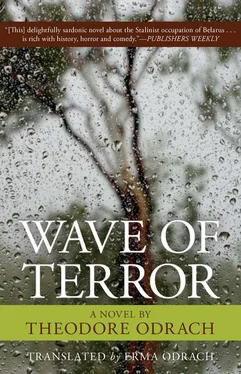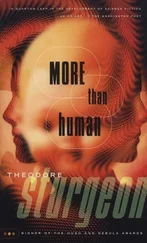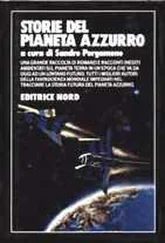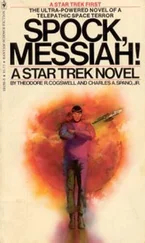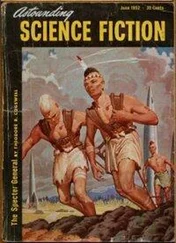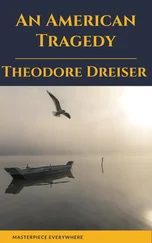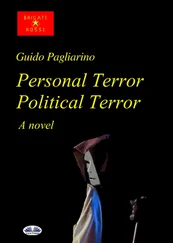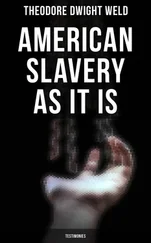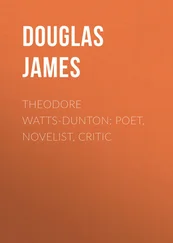Marusia rushed at her and shook her, “Mother, stop it! Stop it right now! What are you saying? You’ve got to pull yourself together. You’re letting your imagination run away with you again.” She whispered to Kulik, “Forgive Mother, she hasn’t been herself lately. As you can see she’s become so disoriented by everything. And she’s been having such terrible mood swings. I’m so afraid something inside of her may be snapping.”
She tried to get her mother to go up and lie down, but Efrosinia resisted her.
Kulik could see the old woman was being torn apart. He had never felt so sorry for anyone as he did for her. No sooner did he feel this way, when Efrosinia seemed to change again, and this time there was a gleam in her eye. Looking at Kulik, she said cheerfully, “Ivan, how nice of you to come and visit us. Come on, get up, take Marusia by the hand and let me take a good look at you. What a pair! Your hair is black as coal and my daughter’s is soft like cotton batting. Go on, walk across the room. Let me take a good look.”
“Oh, Mother, please!” The girl flushed. “Don’t you know when to stop?”
But Efrosinia concentrated on Kulik, measuring him carefully. “Just look at him, Marusia. My, my, what a fine young man he is, moujik or no moujik . How is it that I didn’t see this before? He has such a proud walk, like a true gentleman. So tall and robust, not to mention handsome and educated.” She threw a contemptuous glance at her husband. “He’s nothing like you, you old goat. You clawed me like an animal. And if you had been let loose in some fine home, you would have broken all the furniture. Take a good look at him, it’s never too late to learn a thing or two.”
Valentyn snarled, “Don’t you think you’ve said enough for one night, old woman? Why don’t you just go and lock yourself up in your room and give us some peace and quiet for a change.”
“You want to get rid of me? Why? So you can entertain our young visitor and drink your vodka? Is that your plan? Well, I assure you, I’m far from finished.”
From the window the almost-full moon threw pale streaks of light upon the four walls. A warm breeze rustled the curtains.
Efrosinia fixed her attention once more on Kulik. “Ivan, when I look at you I think of my Lonia. He’s about your age, big and strong, and his hair is dark like yours, only his eyes are brown, not gray and deep-set.” Then, with hope, “Maybe you could help me. You’re young and full of energy. Maybe you could go to Lvov and find Lonia. You could bring him home to me. Will you? Yes? Bless you, son, bless you.”
Encouraged, Efrosinia managed to calm down. She gave her arm to her daughter who drew her into another room.
Valentyn was more than happy to be rid of his wife. Spreading himself comfortably on the sofa, he would have the rest of the evening to himself, without her nagging presence. He lit his pipe. “So, young man, tell me, was there ever an independent Ukraine?”
Kulik was not in a talkative mood, but he forced a reply: “Ukraine has never been a sovereign state, except in the time of Bohdan Khmelnytsky. This was in the summer of 1657, before Belorussia and Russia existed.” Feeling increasingly annoyed and impatient, he tried to change the subject. “Why talk about the past when there’s no place for it in our lives anymore? These are new times and we must learn to cope with what lies ahead.”
Just then Marusia came into the room. How radiant she is, Kulik thought, that glowing complexion, those moist lips. He felt a wave of excitement. All he wanted at that moment was for the old man to stop his incessant chattering and go off to bed.
But Valentyn, refilling his pipe, went on more loudly. “All in all, I’d say life under the Czar was better than it is now. In fact, the officers in the Czar’s army don’t even begin to compare to today’s NKVD men. There used to be more respect for the individual, wouldn’t you say?”
Kulik answered, “And what about the moujiks ? Do you think they also were more respected in the days of the Czar?”
Valentyn gave this question serious consideration. He was delighted to have the undivided attention of such a fine and learned visitor. “ Moujiks , since the beginning of time, have been destined to live lives of poverty and degradation,” he said. “However, if and when they resettled into the cities and acquainted themselves with the finer things in life they were able to think differently. Take me, for example. I was born in a village — in other words, I was born a moujik , and then I became a cabinetmaker. When I lived under the Poles, I took it upon myself to learn Polish, and now that the Russians have taken over I taught myself to speak Russian. And learning Russian was the best thing I could have done for myself and my family. Life became easier. Today when I walk out in the street my neighbors call out: there goes Valentyn Nikodimovich. See how it is, now people always address me by my patronymic, even people I barely know. Villagers live in the dark, they hardly even know what patronymic means! I don’t talk like a moujik anymore, no, I talk like a Russian. I’ve become accepted wherever I go, and people look up to me.” He said to Kulik, “You talk of the new times we live in and how we must learn to cope with them, but why do you resist everything that’s going on around you? How do you singlehandedly propose to fight the established new law? You’ll only lose. It’s better to join them than to fight them.”
Having spoken these words, the old man’s manner changed; he appeared troubled and confused. He scratched his chin. “Hmm … about these Russians, I’ve been giving them some extra thought lately. I have to admit, my mind’s not totally made up. They seem to have some very peculiar ways about them. It’s as though they’re not always what they seem. To be honest, it’s becoming harder and harder to make sense of anything. Innocent people are being pulled out of their homes and vanishing to God knows where. I’m not so sure that things will come to a good end.”
Valentyn paused; his own words seemed to cause him uneasiness, even trepidation. “Yes,” he said, “there’s uncertainty everywhere, and there are many things happening that we don’t like or understand, but in the end, as difficult as it may be, it will be for our own good. That’s what we’re being told and that’s what we must accept. I say it’s better to talk in Russian than in a language of a republic, especially in the cities. I say, leave Ukrainian to the moujiks ! The laws of survival have changed and as painful as it may be, we have no choice but to change with them. As you said earlier, we must learn to cope with what lies ahead.”
To Kulik it was obvious that Valentyn knew quite well everything that was going on around him but chose not to understand it. The words motherland, nation, patriotism had lost their meaning for him. He was accepting the fact that the Ukrainian people, their language and culture, were being annihilated before his eyes. Kulik felt alone, fearfully alone, like a solitary tree in the vast steppe.
A clock on the wall struck ten. Kulik glanced briefly at Marusia, who stood at the window, partially shaded by the muslin curtains. Her face looked different, blank and unmoving, like a mask, and her body seemed almost wooden. Like her father, she had all too readily succumbed to the new laws of the land, a new Russian patriotism, an attitude representative of the petty bourgeoisie in her neighborhood and in neighborhoods like hers all across the republic. Kulik thought, What good is the Ukrainian language when only Russian is being recognized? Let Ukrainian remain in the villages where it belongs with the dull and unenlightened moujik . It has no place in the schools, the government, or public offices.
Читать дальше
